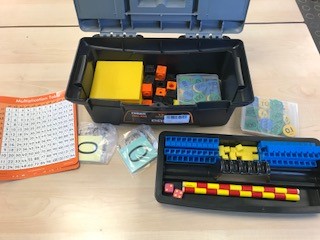Mathematics
Our School Vision:
To create a school that enables all pupils (no matter what background or starting point) to achieve their full potential and promotes the school as a beacon within the community, where aspirations are achieved and dreams are a reality for all pupils, staff and families.
Our Maths Vision:
At St Helen's Primary School, our principle aim is to develop children's knowledge, skills and understanding of Mathematics through exposure of fluency, reasoning and problem solving in all areas of Mathematics.
Maths – No Problem!:
Through the implementation of ‘Maths - No Problem!’ maths lessons at St. Helen's involve the use of the CPA approach (concrete, pictorial and abstract) to support both mathematical fluency and problem solving. The use of concrete objects, such as cubes, place value counters and tens frames gives children lots of opportunities to really understand the new skills they are developing. They then represent their ideas in pictures before moving onto numbers and symbols. There is also a lot of emphasis on vocabulary, discussion and paired work, to make sure that our children are able to explain their learning and find ways to check their answers.
There are five main stages of a Maths — No Problem! Lesson: exploration, structured discussion, practice, journalling and reading.
Exploration: Pupils are given an ‘anchor task’ which is a problem to explore in pairs/groups and is the central focus of the whole lesson.
Structured discussion: Teacher-led whole class discussion through the use of targeted questions to discuss methods used to solve the ‘anchor task’ and rectify any misconceptions.
Practice: Guided practice is where pupils work through questions in the textbook in pairs. Independent practice is where pupils work independently through questions in the workbook. In both the workbook and textbooks questions are designed for pupils to develop a deeper understanding of the topic.
Journalling: Pupils are given a question or task based on the lesson’s problem allowing pupils to explore new ideas and to create a completely personal journal entry, explaining and justifying their calculations and strategies.
Reading: During the lesson, pupils should be given an opportunity to read through the corresponding content in the textbook. It is a time for pupils to reflect upon which methods they think are the most effective and why.
Maths - No Problem! scheme of work adapts a spiral approach, which means that topics are revisited building on pupils’ depth of understanding and levels of difficulty increase as pupils progress through each year group. Learning is delivered in small-step, logical sequences that are organised into individual lessons, the lesson sequence is carefully organised with clear progression.
Maths – No Problem areas of learning:
-number and place value
-calculations – addition and subtraction
-calulations – multiplication and division
-fractions
-decimals
-length
-area and perimeter
-volume
-geometry
-mass
-temperature
-money
-time
-graphs
-position and movement
-ratio
-negative numbers
-algebra
-roman numerals

An example of resources available to pupils in their daily maths lessons
Number Sense:
Fluency of facts is also a fundamental skill that is essential to children developing a secure understanding of Mathematics. Number Sense Maths Programme is implemented in the foundation stage, KS1 and Year 3. The Number Facts Fluency Programme teaches a defined set of addition and subtraction facts and a defined set of calculation strategies. The systematic and structured approach ensures children develop key visual pathways and learn important number relationships. This leads to a deep understanding of number and number relationships, and to fluency in addition and subtraction facts. The Number Sense Maths Programme is taught as discreet sessions.
Mathematics Long and Medium Term Plans:
Foundation Stage Skills Progression Ladder: Number and Numerical pattern skills
Foundation Stage Skills Progression Ladder: Patterns, shape, space and measure skills
Progression Documents:
Maths – No Problem! Spiral approach by topic
Calculation Policy
At St Helen's Primary school, pupils follow the progressive Maths Calculation Policy linked to the Maths – No Problem spiral approach curriculum to ensure that pupils develop a secure understanding of key mathematical concepts. The calculation policy can be found below:
Alongside the calculation policy, we have also developed a range of How-To Videos to support parents/ carers with using the methods at home with their child. The How-To videos can be found following this link:
Maths Calculation Policy How- To videos
Times Table Rock Stars
It is the expectation that all children know their all of their times tables by the time they leave Year 4. Since the summer term of 2022, schools in England are required to administer an online multiplication tables check (MTC) to year 4 pupils. In order to prepare our children for the check, we have purchased a Times Tables Rock Stars log in for all children to allow them to practise their times tables in a fun, interactive way online. Your child should have bought their log in home, but if you haven't received it, or you are unable to find it, then please ask your child's teacher. Follow the link below to access the website:
Year 4 Multiplication Check
Year 4 children will undertake the Year 4 online Multiplication Tables Check (MTC) during the summer term. This check will be completed by all Year 4 children nationally. The purpose of the MTC is to determine if pupils can recall their times tables fluently up to and including 12 X 12. It will then identify pupils who have not yet mastered their times tables so that additional support can be provided in years 5 and 6.
All year 4 pupils have received a Times Table Flash Card pack to take home to practise their multiplication facts. We ask that pupils practise the flashcards each night and then return the pack by Friday each week for a new set of cards. It is important that pupils engage with this additional learning so that they become fluent in their recall of multiplication facts.
Information about the Multiplication Check can be found below:
Multiplication Check Parental Letter



Close